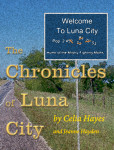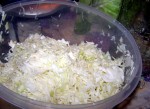 Oh, what is there to say about Mills Farm, the destination event-venue, country-themed retail emporium, petting zoo, specimen herb garden, and country amusement park just to the south of Luna City which has not been said a thousand times already in expensive full-page advertisements in glossy lifestyle and travel magazines, or in television spots that are enticing mini-movies all crammed into sixty seconds? Because Mills Farm is owned and run by a large corporation who also own and run many similar properties – all tailored to local idiom and conditions – star-scattered across the United States and Europe, the money and expertise is most definitely there.
Oh, what is there to say about Mills Farm, the destination event-venue, country-themed retail emporium, petting zoo, specimen herb garden, and country amusement park just to the south of Luna City which has not been said a thousand times already in expensive full-page advertisements in glossy lifestyle and travel magazines, or in television spots that are enticing mini-movies all crammed into sixty seconds? Because Mills Farm is owned and run by a large corporation who also own and run many similar properties – all tailored to local idiom and conditions – star-scattered across the United States and Europe, the money and expertise is most definitely there.
Nothing shows of this, of course, with regard to Mills Farm. It’s all a carefully crafted down-home Texas experience, down to the cherubic and beaming countenance of Mills Farm’s official greeter, Old Charley Mills himself, resplendent in immaculate overalls and calico shirt, with a carefully ragged straw hat on the back of his head, presiding over the entrance and occasionally throwing down a pitchfork of hay into the calf enclosure, or riding around seated on a carefully restored small-front Farmall F-20 tractor. Mills Farm is all about the theater.
There is a theater, by the way – an open-air amphitheater, with a series of expertly graded, terraced and grass-grown slopes, where the audience can spread out picnic blankets or folding chairs. There is also a carefully quaintified old-fashioned style dance hall for smaller, more intimate gatherings and dances. The Mills farmstead – a turn of the last century ginger-bread cottage painted white and adorned all the way around with covered screen-porches – is a bed and breakfast. It is not the original Mills farmhouse; oh, dear no – that was an unsavory shack which burned to the ground in 1927, possibly by the last private owner of Mills Farm for the insurance money. This present building was moved with great care from the lot in Beeville where it had originally been situated. Other, smaller cottages on the property are also available for overnight stays. Most of the other structures at Mills Farm have also been brought in, or reconstructed to serve the various purposes. They host weddings, corporate retreats, concerts and what-have-you; but the traveling public is always encouraged to drop in for a brief visit to the general store, to wander in a herb garden laid out in the form of an acre-sized Texas flag and then to restore themselves with a meal at the Mills Farm Country Restaurant; part of the dining area is in a wide screened porch above a scenic bend in the river, with a grove of noble oak trees and a seasonal wild-flower meadow beyond. Every aspect pleases – and no expense has been spared in making and keeping it so.
Mills Farm is one of the largest single employers in the area. Since it opened, some thirty years ago, two generations of Luna City teenagers have cut their teeth in the job market by working there in the summer – waiting tables, working the cash register in the general store, or helping set up for events. The Gonzales and Gonzalez family enterprises are also important cogs in the machinery of Mills Farm, for facility-maintenance and grounds-keeping, mainly, although Cousin Teodoro “Teddy” Gonzalez also plays an extremely vital role in the grand theater of Mills Farm.
Teddy Gonzalez was raised in Chicago after his father – Jaime Gonzalez’s younger brother Alfredo – went to work in Henry Ford’s River Run aircraft plant during World War II and married an Anglo girl from Minnesota. He didn’t come back to Luna City until he retired and got tired of shoveling show in the winter. Teddy sports a snowy white Santa Claus beard, and when he forgets, he sounds more like a Minnesotan when he speaks, but mainly, all he has to say is, ‘Howdy, partner – welcome to Mills Farm!’ or ‘Bye, folks – y’all come back here right soon, you hear?’ ”
Yes, Cousin Teodoro plays Old Charley Mills: he and his wife live in one of the staff cottages on the grounds, so that he is always on hand. It’s an easy job for him, though – the general manager, Benny Cordova takes care of all the heavy lifting. Benny Cordova is mildly renowned for being the only local Hispanic employee not related in any way to the Gonzaleses or Gonzalezes – he is, in fact, a foreigner from Beeville, and has only a vague notion of the true history of the real Old Charley Mills – reprobate, bootlegger, drunkard, bigamist and all-around blot on the civic escutcheon.
Only a few of the oldest inhabitants of Luna City have any first-hand recollection of Old Charley Mills: Miss Letty McAllister, Dr. Wyler, and perhaps one or two others. Charley Mills was in his final disgraceful decade of life when they were children; he was the sort of character whom small children were usually warned against by their mothers, so vivid memories of him persisted. An accounting of his criminal and antisocial deeds take up a full chapter of A Brief History of Luna City, Texas, and are memorialized by the historical marker in Town Square at the foot of the tree from which he was nearly lynched in 1926 by long-suffering and wholly exasperated citizens. Upon his death, during the depths of the Depression – from natural old age, much to the surprise of the county coroner and the Luna City police department, and the disappointment of any number of his present and former wives – the property comprising the farm fell even more into disrepair. The surviving wives, assorted Mills family heirs and associates, and the even more numerous creditors fought over it like the gingham dog and calico cat for the next thirty years, until there was nothing left but a collection of ragged scraps and forty acres of derelict farmland. The corporation which now runs the revived Mills Farm purchased it from the last heir left standing in the 1970s, and dedicated another decade to rebuilding it to their vision.
Now and again, the corporate managers give a thought to expanding the attractions in the direction of Luna City … but then someone reminds them of the Charley Mills file in the offices of the Luna City Police Department, and soberer judgement reins in such plans. For now, anyway.




Recent Comments